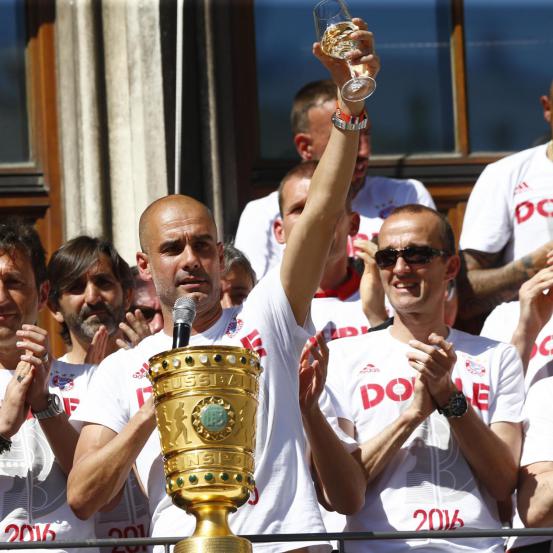- Commissioner’s statement on Ventura, Marte
- Ronnie O’Sullivan: Masters champion ‘felt so vulnerable’ in final
- Arron Fletcher Wins 2017 WSOP International Circuit Marrakech Main Event ($140,224)
- Smith challenges Warner to go big in India
- Moncada No. 1 on MLB Pipeline’s Top 10 2B Prospects list
- Braves land 2 on MLB Pipeline’s Top 10 2B Prospects list
- Kingery makes MLB Pipeline’s Top 10 2B Prospects list
- New Zealand wrap up 2-0 after Bangladesh implosion
- Mathews, Pradeep, Gunathilaka to return to Sri Lanka
- Elliott hopes for rain for Poli
Grading Pep Guardiola on His 2015/16 Season with Bayern Munich
- Updated: May 24, 2016

Pep Guardiola is one of the most polarizing figures in world football. The Bayern Munich trainer is seen by many as a god of coaching who can do no wrong, while to others he is a fraud.
Few have a neutral opinion on Guardiola, whether about his record, his performance, his aptitude in any of the many areas of coaching, or his personality.
This article will attempt to assess Guardiola objectively based on his performance in the 2015-16 season at Bayern. Coaching is a complicated profession, so he will be assessed based on his tactical, motivational and squad-building performance, as well as the results he and his Bayern team achieved.
In the end, he’ll be assessed on aggregate and given a final grade, summing up his overall performance as a coach in 2015-16.
Tactics
Tactics are the area Guardiola is most renowned for, but the 2015-16 season seemed to show that part of coaching isn’t his strongest point. True, he made some daring decisions, but willingness to try strange things doesn’t necessarily make these decisions brilliant, even if they result in wins.
The decision to play Jerome Boateng in midfield against Hertha Berlin last November, for example, didn’t cost Bayern any points, but it limited the centre-back’s effectiveness by using him in a role in which his strengths are utilized less and his weaknesses become more prominent.
There were some tactical successes, like playing with five forwards and undersized centre-backs and still maintaining a great defensive record. Guardiola got his attackers to defend on the front foot, and his back line spent more time chasing hopeful long balls and clearances than defending in a classical sense.
Still, Guardiola appeared to meet his match tactically twice in the UEFA Champions League: against Juventus and Atletico Madrid.
Massimiliano Allegri set up his Juve side perfectly to face Bayern: In spite of the absence of his best defender (Giorgio Chiellini in both legs), striker (Paulo Dybala, in the second leg), and key midfielder Claudio Marchisio (for three-quarters of the tie), Juve were going to advance until a last-gasp equalizer forced extra time and Bayern eventually advanced.
Atleti played the first leg of the semi-finals without Diego Godin, perhaps the most important player in their defense-oriented team, and with a squad that simply did not match Bayern’s available team man-for-man.
Yet Diego Simeone got the better of the former Barcelona boss (this article discusses Guardiola’s tactical mistakes in the first leg), and although it was close until the end, his unfavored side came out victorious.
Grade: B-
Motivation
What Guaridola lacked tactically, he made up for in terms of motivating his players. It’s important to distinguish one from the other.
Whether threatening his players with castration at half-time of the second leg of the Juventus tie (as Thomas Muller joked, per Goal) or screaming in young Joshua Kimmich’s face after the March draw with Dortmund, Guardiola regularly got the best out of his team, and Bayern rarely looked anything but up for the task.
The team was supremely confident and never looked out of contention, even in the few instances in which the odds of their success looked slim.
Motivation was perhaps the single most important factor in Bayern’s success in the 2015-16 Bundesliga and in the …
continue reading in source www.bleacherreport.com
